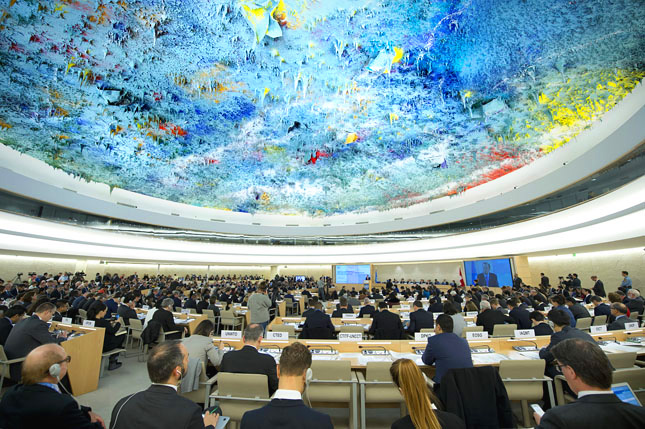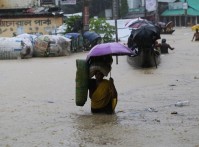-
Climate Policy vs. Climate Ethics? A Debate on Justice and Our Global Future
July 5, 2016 By Cara Thuringer
As the international community looks to the Paris climate agreement and beyond, a key question emerges: Will strong ethical arguments or pragmatic national interest lead to a safe and sustainable future? Can these two perspectives coexist? [Video Below]
Stephen Gardiner, a philosophy professor at the University of Washington, and David Weisbach, a law professor at the University of Chicago, take up two sides of this debate in the new book, Debating Climate Ethics. Speaking at the Wilson Center on June 15, they traded points about whether an ethical framing or a focus on self-interest paves the path for meaningful action on climate change.
Practicality vs. Morality?
“In theory, [climate change] is an ethical problem but right now ethics have nothing to say about it,” said Weisbach. The problem is that an ethical framework only discusses what ought to be done, not how, and when translated to policy it presents logical incoherencies, he said.
For example, the Paris climate agreement includes a target to limit the increase in temperatures to no more than two degrees Celsius above pre-industrial levels. “If an ethical theory says…India can put in as many coal plants as it wants because it’s poor, that ethical theory has to be wrong because it is telling us to do something that is going to destroy the planet,” said Weisbach.
Further, many of the ethical theories that influence policy are redundant, Weisbach said. “We don’t need a lot of distributive justice theories to say wealthy nations need to reduce more because we are emitting more,” for example. A purely mathematical accounting of the problem will bring you to the same conclusion.
Gardiner counters that “the official rejection of ethics prevents us from raising some central questions.” The driving idea behind an ethical approach to climate policy is that ethics helps identify relevant problems and frames them in a way that protects society from falling into disastrous moral pitfalls.
Climate change is the “perfect moral storm,” he said, “the problem is genuinely global, it is intergenerational, it is ecological, and there is a really heavy theoretical component.”
A purely self-interested approach may simply pass the buck to future generations, forwarding on difficult choices because there are few immediate consequences. The intergenerational responsibility gap extends in both directions. Climate change is a problem that must be addressed by the current generation, despite previous generations holding the majority of the responsibility for creating it, and future generations facing the largest impacts.
A self-interested approach could lead nations that are most heavily impacted taking up a heavier burden than less impacted nations because it is in their interest to do so, said Gardiner. But this directly contradicts the distributive justice theories that call on nations who hold a greater share of the responsibility to take on the largest burden of correcting the resulting harms.
The danger of an approach to climate policy that excludes ethics is that we end up acting as the judges in our own case, said Gardiner. That is to say, without an ethical framework to guide the way, how do governments develop policy that reflects fairness and equity not only for the current generation but the future and past?
Reflections in the UNFCCC
An additional panel of experts joined Weisbach and Gardiner to provide further thought on whether ethics and practicality can exist in the context of the United Nations Framework Convention on Climate Change. They noted that actual climate policy as negotiated via the UNFCCC is an approach that mixes both considerations.
Gwynne Taraska, associate director for energy policy at the Center for American Progress, said “everyone on the ground understands climate change to be an ethical issue…on the other hand, you have national circumstances.”
She pointed to the concept of “loss and damage,” which is gaining traction in climate negotiations, as an attempt to balance national interest with ethics. Loss and damage is the idea that climate change will inflict irreparable losses, such as lives, land, and heritage and culture, as well as reparable damage, such as to infrastructure and crops.
“An objection to two degrees is that it would amount to facilitating what they think of as genocide”Loss and damage is often conflated with liability and compensation, Taraska said, and this was a significant stumbling block of the Paris Agreement. But “the concepts are distinct.” Loss and damage, she said, is not a system to make large emitters legally culpable for the impacts of climate change, rather it is a way to help compensate those facing major impacts, regardless of who pays. “You can think that we ought to act collaboratively on loss and damage without thinking that it’s helpful to talk about moral and legal concepts like liability and compensation.”
Ethical considerations are also present in the 2.0- and 1.5-degree goals outlined in the Paris Agreement, said Gardiner. Two degrees is the official target, but the more aggressive target was also included as an aspirational goal, under the banner “1.5 to Stay Alive.”
“Representatives of African nations have argued…that the two degree target is inadequate, 1.5 would be better, and indeed an objection to two degrees is that it would amount to facilitating what they think of as genocide,” Gardiner said. “If you’re not protecting Africa sufficiently, the thought is, then you are not actually framing the problem correctly.”
Lastly, the process of the Intended Nationally Determined Contributions, or INDCs, is state-led but designed to promote equity. Every nation – developed and developing – is responsible for determining what emissions reductions they can achieve and reassessing their commitments regularly with the goal of increasing ambitions and reaching global targets.
This approach is a hybridization of the 1997 Kyoto Protocol and failed 2009 Copenhagen negotiations, said David Waskow, director of the International Climate Initiative at the World Resources Institute. The Kyoto Protocol was a top-down system where emissions reductions were externally determined and assigned. When it failed, a new bottom-up system was developed, but crumbled during the Copenhagen negotiations.
The INDCs agreed to at Paris have elements of both predecessors. “What has been created is an agreement that really mobilized countries to come forward with what they were prepared to do,” Waskow said, “but in turn, once countries have done that, also keeps the pressure on…for taking action.”
Bend Don’t Break
On one hand, there is an immediate demand for practical climate solutions that ethics will not be able to fulfill, Weisbach said. Ethical theories call for reparations for those who have and will suffer the most, but fall short on how to bring about that action.
On the other, relying on the self-interest of governments alone may lead to distorted outcomes that dodge the most difficult questions. Climate policy has taken decades to evolve, putting us in a position where we may have less than 40 years to transition to a global economy that produces zero emissions. But climate change clearly poses a “severe ethical challenge” as well, Gardiner said.
Climate change is a dynamic challenge, said Alyssa Bernstein, associate professor of philosophy at Ohio University, requiring a framework that can quickly be adapted to rapid shifts in geopolitical and climatic factors. An agreement that is too rigid may break in response to strong climatic shocks, yet, if too flexible, may not cap global emissions before it is too late.
Event Resources:
Photo Credit: The Human Rights and Alliance of Civilizations Room, Palais des Nations, courtesy of Jean-Marc Ferré/UN Photo.
 A Publication of the Stimson Center.
A Publication of the Stimson Center.






